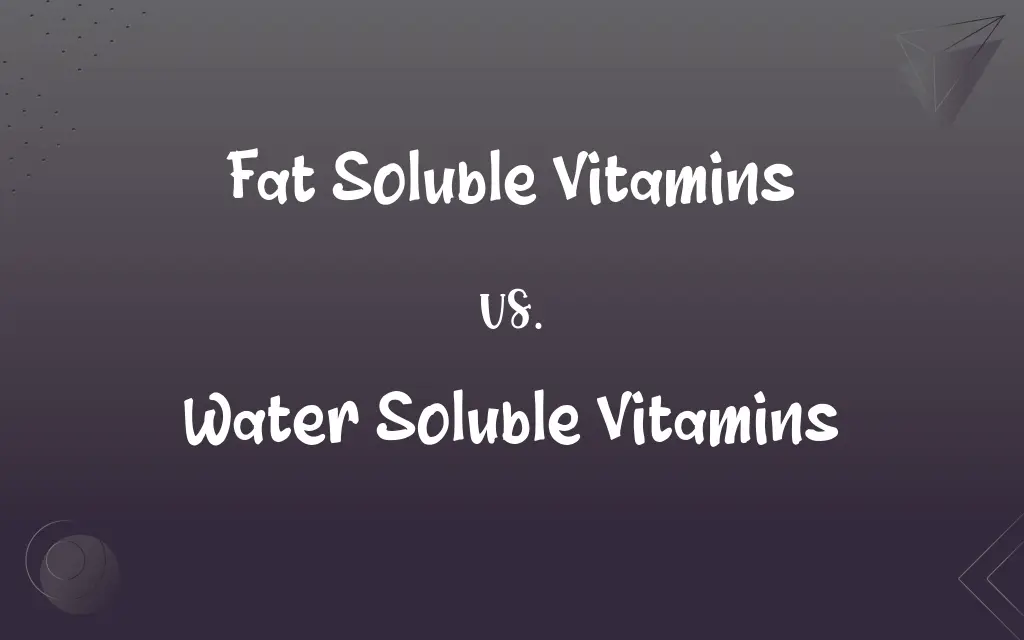Fat Soluble Vitamins vs. Water Soluble Vitamins: What's the Difference?
Edited by Janet White || By Harlon Moss || Updated on October 7, 2023
Fat-soluble vitamins are stored in the body's fatty tissue, whereas water-soluble vitamins must be consumed regularly as they’re not stored in the body.

Key Differences
Fat-soluble vitamins, including vitamins A, D, E, and K, are stored within the body's fatty tissue and liver, ensuring a reserve in case of low dietary intake. Water-soluble vitamins, conversely, lack the ability for prolonged storage in the body and excess is usually excreted through urine, necessitating regular consumption.
Fat-soluble vitamins play integral roles in various biological functions such as vision, immune function, and blood clotting. Water-soluble vitamins, which include the B-vitamin complex and vitamin C, are crucial for energy production, antioxidant activity, and maintaining nerve function, respectively.
Fat-soluble vitamins are best absorbed with dietary fat and can accumulate within the body, potentially reaching toxic levels if overly consumed. Water-soluble vitamins are more easily absorbed and, due to their inability to be stored for long periods, pose a significantly lower risk of reaching toxic levels.
Deficiency of fat-soluble vitamins might appear gradually, due to their storage capability, potentially leading to long-term health issues if not addressed. In contrast, a deficiency in water-soluble vitamins might manifest more quickly, often resulting in immediate symptoms, which can be detrimental if not quickly rectified.
The major sources of fat-soluble vitamins tend to be high-fat foods, including oils, dairy, and certain vegetables. Water-soluble vitamins are predominantly found in a wide array of foods, including fruits, vegetables, and grains, necessitating a diverse diet to ensure adequate intake.
ADVERTISEMENT
Comparison Chart
Storage in Body
Stored for use in future
Not stored, regularly needed
Absorption
With dietary fat
Easily absorbed
Risk of Toxicity
Higher due to storage
Lower
Deficiency Onset
Slow due to storage
Rapid
Major Examples
Vitamins A, D, E, K
Vitamins B, C
ADVERTISEMENT
Fat Soluble Vitamins and Water Soluble Vitamins Definitions
Fat Soluble Vitamins
Fat-soluble vitamins facilitate the utilization of macro-nutrients and support various physiological processes.
Vitamin E, a fat-soluble vitamin, acts as a potent antioxidant.
Water Soluble Vitamins
Water-soluble vitamins are eliminated through urine, minimizing the risk of toxicity.
Excessive vitamin C, a water-soluble vitamin, is excreted, preventing toxicity.
Fat Soluble Vitamins
Fat-soluble vitamins assist in diverse functions like vision, blood clotting, and maintaining healthy skin.
Vitamin A, a fat-soluble vitamin, is pivotal for vision.
Water Soluble Vitamins
Water-soluble vitamins play a pivotal role in energy production and maintaining neurological function.
Several B vitamins, being water-soluble, facilitate metabolism.
Fat Soluble Vitamins
Fat-soluble vitamins can accumulate in the body, sometimes leading to hypervitaminosis if excessively consumed.
Hypervitaminosis A is caused by excess intake of the fat-soluble vitamin A.
Water Soluble Vitamins
Water-soluble vitamins support the protection of cells from oxidative stress and enhance wound healing.
Vitamin C, being water-soluble, aids in skin repair.
Fat Soluble Vitamins
Fat-soluble vitamins are often found in oils, dairy, and fatty foods, providing a nutrient reserve during dietary deficiencies.
Fish liver oil is rich in vitamin A, a vital fat-soluble vitamin.
Water Soluble Vitamins
Water-soluble vitamins, such as B and C, often require daily intake due to their non-storage nature.
Consuming citrus fruits ensures a steady intake of vitamin C, a water-soluble vitamin.
Fat Soluble Vitamins
Fat-soluble vitamins are nutrients that dissolve in fats and can be stored in the body's adipose tissue.
Vitamin D, a fat-soluble vitamin, is vital for calcium absorption.
Water Soluble Vitamins
Water-soluble vitamins are nutrients that dissolve in water and are generally not stored in the body.
Vitamin C, a water-soluble vitamin, is crucial for immune function.
FAQs
What are common sources of fat-soluble vitamins?
Fatty foods, dairy products, and certain vegetables and fruits are rich in fat-soluble vitamins.
How are water-soluble vitamins different from fat-soluble vitamins?
Water-soluble vitamins cannot be stored in the body and need to be regularly replenished, while fat-soluble vitamins can be stored.
Can fat-soluble vitamins pose a risk if consumed in excess?
Yes, because fat-soluble vitamins are stored in the body, excessive consumption can lead to toxicity.
Are water-soluble vitamins easily excreted from the body?
Yes, excess water-soluble vitamins are generally excreted through urine.
What role does Vitamin D, a fat-soluble vitamin, play in the body?
Vitamin D is crucial for calcium absorption and promoting bone health.
Why is Vitamin C, a water-soluble vitamin, essential for health?
Vitamin C is vital for immune function, skin health, and antioxidant protection.
What happens if fat-soluble vitamins are consumed without dietary fat?
Absorption may be compromised as dietary fat aids in the uptake of fat-soluble vitamins.
How does Vitamin B12, a water-soluble vitamin, assist in neurological function?
Vitamin B12 is crucial for nerve function, and aids in the production of DNA and RNA.
What are fat-soluble vitamins?
Fat-soluble vitamins are vitamins A, D, E, and K, which are stored in the body's fatty tissues and liver.
What are key sources of water-soluble vitamins?
Fruits, vegetables, and grains predominantly contain water-soluble vitamins.
Can a deficiency of fat-soluble vitamins be detrimental in the long run?
Yes, deficiency might lead to chronic health issues, as these vitamins support crucial physiological functions.
Are water-soluble vitamin deficiencies quickly noticeable?
Often yes, due to their role in immediate physiological functions and the inability to be stored.
Is it possible to have a toxicity of water-soluble vitamins?
Rarely, as excess water-soluble vitamins are typically excreted, though very high doses can have side effects.
Why are B vitamins, which are water-soluble, essential for metabolism?
B vitamins play a crucial role in energy production and red blood cell formation.
How quickly can water-soluble vitamin levels be replenished through diet?
Fairly quickly, as they are easily absorbed, but a consistent intake is required for maintaining optimal levels.
What role does Vitamin E, a fat-soluble vitamin, play as an antioxidant?
Vitamin E helps protect cells from oxidative stress by neutralizing free radicals.
How are fat-soluble vitamins absorbed by the body?
Fat-soluble vitamins are best absorbed when consumed with dietary fats.
Is regular intake crucial for maintaining water-soluble vitamin levels?
Yes, regular intake is vital as water-soluble vitamins are not stored in the body.
How can fat-soluble vitamin reserves be built in the body?
Consuming foods rich in vitamins A, D, E, and K can gradually build reserves in the body.
How does vitamin A, a fat-soluble vitamin, support vision?
Vitamin A is vital for forming the light-absorbing molecules in the eye.
About Author
Written by
Harlon MossHarlon is a seasoned quality moderator and accomplished content writer for Difference Wiki. An alumnus of the prestigious University of California, he earned his degree in Computer Science. Leveraging his academic background, Harlon brings a meticulous and informed perspective to his work, ensuring content accuracy and excellence.
Edited by
Janet WhiteJanet White has been an esteemed writer and blogger for Difference Wiki. Holding a Master's degree in Science and Medical Journalism from the prestigious Boston University, she has consistently demonstrated her expertise and passion for her field. When she's not immersed in her work, Janet relishes her time exercising, delving into a good book, and cherishing moments with friends and family.
































































